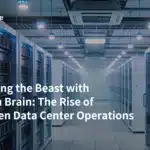High-density data centers are the backbone of our connected world, powering everything from cloud services to artificial intelligence. As data centers continue to grow in size and complexity, the demand for efficient cooling solutions has never been more critical. Traditional air-cooling systems are struggling to keep up with the intense heat generated by high-density computing environments. This has led to a surge in interest and innovation in liquid cooling technologies, which offer a more effective and energy-efficient alternative.
The Rise of Liquid Cooling
Liquid cooling is not a new concept, but its application in data centers has evolved significantly. The basic principle is simple: liquids can absorb and transfer heat more effectively than air. However, implementing liquid cooling in a data center environment requires careful planning and advanced engineering. The high cost, complexity, and potential for leaks have been barriers to adoption. Yet, as data centers become more densely packed with powerful hardware, the benefits of liquid cooling—such as improved thermal management, reduced energy consumption, and extended hardware lifespan—are too significant to ignore.
Micro-Channel Liquid Cooling: Precision and Efficiency
Micro-channel liquid cooling is one of the most promising architectures for high-density data centers. This approach involves directing coolant through tiny channels etched into the surfaces of heat-generating components, such as CPUs and GPUs. The small size of these channels allows for intimate contact between the coolant and the heat source, maximizing heat transfer efficiency. This method is particularly effective for cooling high-power density areas, as it can precisely target hotspots and quickly dissipate heat. However, the design and manufacturing of micro-channel systems are complex, requiring precise engineering to ensure optimal performance and reliability.
Spray Liquid Cooling: Coverage and Adaptability
Spray liquid cooling offers a different approach by applying coolant directly onto the surface of components in a fine mist. This method ensures comprehensive coverage, making it suitable for various hardware configurations. The spray can be easily adjusted to target specific areas, providing flexibility in cooling different types of equipment. It also allows for quick cooling response, as the coolant can be rapidly distributed across the surface. Despite these advantages, spray cooling systems must be carefully managed to prevent over-saturation and potential damage to electronic components.
Immersion Liquid Cooling: Total Submersion for Ultimate Cooling
Immersion liquid cooling takes the concept to the extreme by submerging entire server components in a specialized dielectric fluid. This method provides unparalleled cooling efficiency, as the fluid surrounds every surface of the hardware, absorbing heat from all directions. It is especially beneficial for ultra-high-density environments where heat generation is intense and consistent. The sealed nature of immersion systems also minimizes the risk of leaks and contamination. However, the initial cost and the need for specialized infrastructure can be prohibitive for some data center operators.
The Future of Liquid Cooling in Data Centers
As data centers continue to evolve, so too will liquid cooling technologies. Researchers and engineers are constantly exploring new materials, Coolant formulations, and system designs to enhance performance and reduce costs. The integration of AI and machine learning is also playing a role in optimizing cooling systems, allowing for real-time adjustments based on workload and thermal conditions. This smart approach can further improve energy efficiency and extend the lifespan of cooling infrastructure.
Why ByteBridge
ByteBridge, a company at the forefront of liquid cooling innovation, offers a liquid cooling as a service solution. Our approach focuses on providing modular, scalable, and efficient cooling systems tailored to the specific needs of high-density data centers. By emphasizing flexibility and adaptability, ByteBridge aims to make liquid cooling more accessible and practical for a wide range of data center environments. Our commitment to advancing liquid cooling technology aligns with the growing demand for sustainable and high-performance cooling solutions in the data center industry.
Read more
ByteBridge Launches Industry’s First Foundational Liquid Cooling Certification (FLCC) Program
Liquid Cooling Training: Bridging the Knowledge Gap in AI Data Centers
Direct-to-Chip Cooling Explained: The Future of Liquid Cooling in AI Data Centers
From Pilot to Production: Liquid-Cooled Load Bank Rentals That Keep HPC Projects on Schedule






